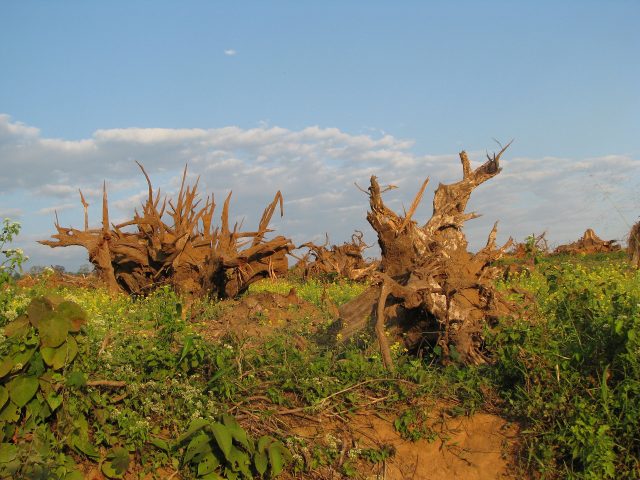A tenth of the wilderness on our planet destroyed by mankind in just 25 years
 Image source"
title="Deforestation around Pakke Tiger Reserve, India - Image source"
width="640"
height="480"
/>
Image source"
title="Deforestation around Pakke Tiger Reserve, India - Image source"
width="640"
height="480"
/>
All one has to do to see the alarming rate of deforestation of the last remaining wilderness areas left in the world is take a good look at Google Maps.
“But” you say, ”that’s on another continent, it doesn’t affect me.” The reality is that it affects every living thing on the planet.
Since 1993 the seemingly most intelligent species on the planet has destroyed over one tenth of the remaining wilderness and even with the slowdown of deforestation rates, if nothing is done to stop this destruction there will be none left, possibly within the lifetimes of our children and grandchildren.
The Brazilian rainforest, central and northern Africa, upper North America, northern Russia, central Australia, and smaller areas near the Himalayas and the South Sea Islands are disappearing faster than they can be protected.
Most of these areas are home to endangered species that won’t last more than a few decades unless things change quickly. Even more importantly, mankind is killing itself by removing life giving carbon that creates the ecological balance so necessary for life on Earth.

These unspoiled wilderness areas are home to plants that create lifesaving medicines, indigenous tribes that don’t need or want hotels, electricity or roads, and endangered animals, fish, birds, and insects.
No one knows how this will affect the Earth’s ecosystem because the almighty dollar stands in the way of interest and examination of the big picture.
Recently, a study was published by Dr. James Watson, of the University of Queensland and Wildlife Conservation Society and his colleagues. In 2014 Dr. Watson was elected president of the Society for Conservation Biology.
Dr. Watson has elucidated, “My focus will be on engaging more young people from around the world in conservation activities, and reframing conservation science to be more solution-oriented.”
In his paper Dr. Watson noted, “Without any policies to protect these areas, they are falling victim to widespread development. We probably have one to two decades to turn this around.”
Dr. Watson defined wilderness as “ecologically largely intact” and “mostly free of human disturbance”. The reasons for the slow response in protecting some of these areas are that they are at this time considered to be free of immediate danger and are not considered a priority.

If these narrow-minded bureaucrats don’t change their attitudes, the entire planet will be at risk.
According to Distinguished Professor William Laurance of James Cook University in Cairns, Australia, “Environmental policies are failing the world’s vanishing wildernesses.
Despite being strongholds for imperiled biodiversity, regulating local climates, and sustaining many indigenous communities, wilderness areas are vanishing before our eye.” Professor Laurence is the recipient of the BBVA Frontiers in Ecology and Conservation Biology Award, a Distinguished Service Award from the Society for Conservation Biology, and the Heineken Environment Prize.
He has also collaborated on and published over 400 scientific and popular articles and eight books on the subject of how the loss of valuable wilderness areas is affecting our world. “There are four reasons why we need to protect these places.
One is biodiversity, the second is carbon, the third is the poorest of the poor are living in them, and the fourth is this is a reference point for nature, of pre-human environments,” he was quoted as saying.
Even if man were to try to restore the areas that have been destroyed, it would be futile. Although nature could reinvent these areas, nothing could restore them to an original condition which prevents natural species of wildlife and plant life from flourishing there again.
Although the Brazilian government has adopted support of programs to save native people and carbon created in the rainforest it will not be enough. Carlos Rittl, executive secretary of the Brazilian Climate Observatory, remarked on Dr. Watson’s publication, “This paper is a powerful reminder of the key role forests play on climate targets, and should be taken at heart by policymakers.
Despite the recent drop in deforestation rates, Brazil is still the tropical country that most loses forests every year. Our Paris pledge on deforestation is shamefully weak – we are conformed to ending only illegal deforestation by 2030 and only in Amazonia – and we don’t even have a plan for achieving that little. If the government is serious about meeting the deal’s long-term goal, it should be talking about zero deforestation.”
If you have any comments then please drop us a message on our Outdoor Revival Facebook page
If you have a good story to tell or blog let us know about it on our FB page, we’re also happy for article or review submissions, we’d love to hear from you.
We live in a beautiful world, get out there and enjoy it.
Outdoor Revival – Reconnecting us all with the Outdoors
